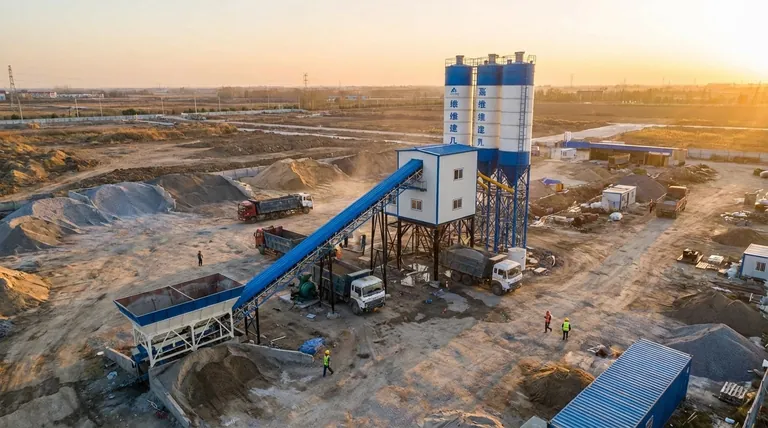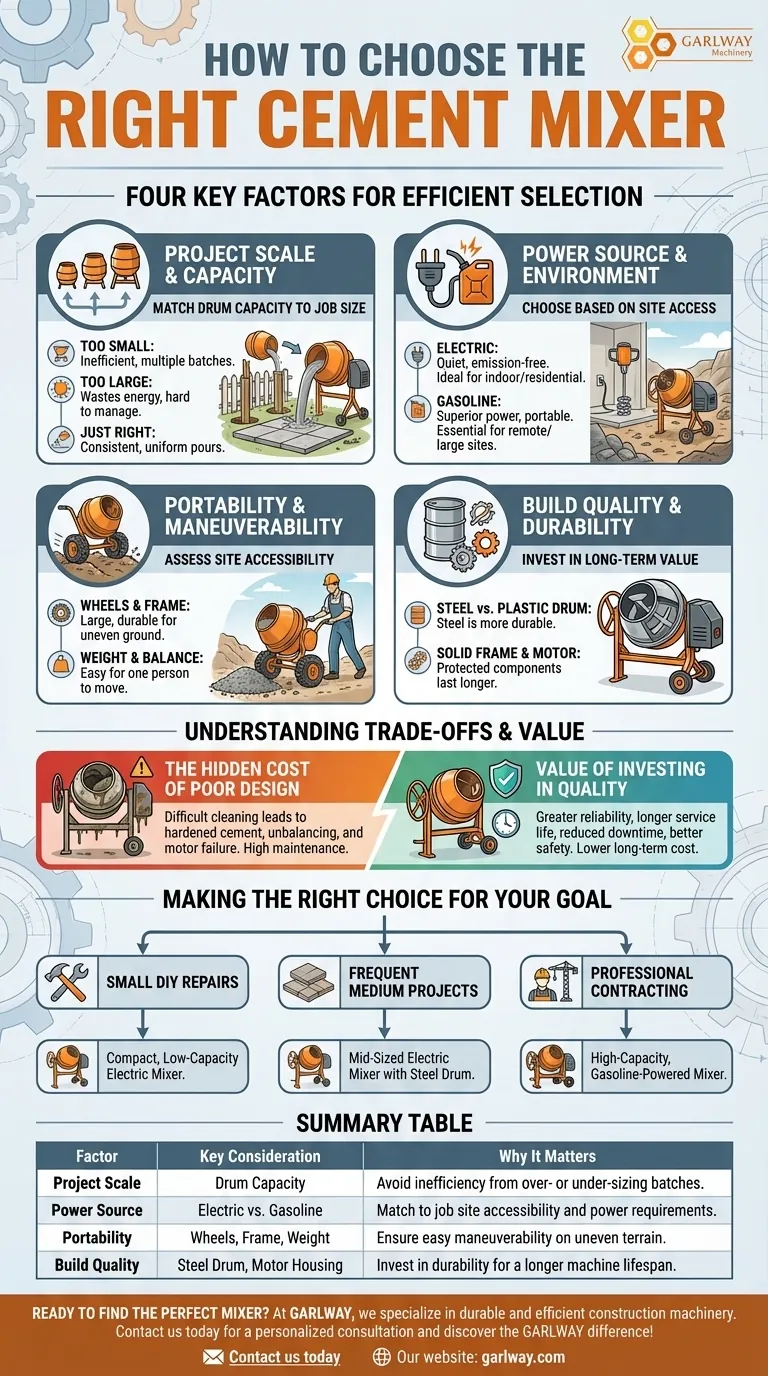When choosing a cement mixer, the decision rests on four primary factors: the scale of your project, your access to a power source, the machine's build quality, and its portability on the job site. Understanding how these elements relate to your specific needs is the key to selecting a tool that is both efficient and cost-effective.
The best cement mixer isn’t the most powerful or the largest; it's the one that is correctly sized for your typical jobs, powered for your environment, and built to withstand the rigors of the work you do.

Decoding Your Project's Needs
Before looking at any specific model, you must first define the work the mixer will be doing. The project itself dictates the machine's required specifications.
Factor 1: Matching Capacity to Your Job Scale
The most critical factor is the mixer's drum capacity, which determines how much concrete you can produce in a single batch.
Over- or under-sizing your mixer leads to inefficiency. A mixer that's too small requires multiple time-consuming batches, while one that's too large wastes energy and can be difficult to manage for small pours.
For small residential jobs like setting fence posts or a mailbox, a smaller capacity mixer is ideal. For larger projects like pouring a patio slab or a small foundation, you will need a machine with a significantly larger capacity to ensure a consistent, uniform pour.
Factor 2: Choosing the Right Power Source
The environment where you work will determine the best power source. Your options are typically electric, gasoline, or manual.
Electric mixers are quiet, emission-free, and perfect for residential areas or indoor work where a power outlet is readily available.
Gasoline-powered mixers offer superior power and complete portability, making them essential for remote job sites or large-scale projects where electricity is not accessible.
Evaluating the Machine Itself
Once you understand your project requirements, you can assess the physical characteristics of the mixer to ensure it meets your standards for usability and longevity.
Factor 3: Portability and Maneuverability
A mixer is useless if you can't get it to the work area. Consider the machine's wheels, frame, and overall weight.
Look for large, durable wheels that can handle uneven terrain and a well-balanced frame that makes it easy for one person to move and position the mixer.
Factor 4: Build Quality and Durability
A cement mixer is an investment that should last. Pay close attention to the materials and construction, as this directly impacts its lifespan.
A steel drum is more durable than a plastic one. Check for a solid frame, a well-protected motor housing, and high-quality mixing paddles or blades inside the drum, as these components endure the most stress.
Understanding the Trade-offs
A cheap tool can become expensive quickly through breakdowns and poor performance. Recognizing the long-term implications of your choice is essential.
The Hidden Cost of Poor Design
Ease of maintenance is a crucial, often overlooked, feature. A mixer that is difficult to clean will retain hardened cement, which unbalances the drum and puts stress on the motor, leading to premature failure.
Always clean your mixer immediately after use. Models designed with this in mind provide better access to the drum interior and have fewer areas where concrete can become trapped.
The Value of Investing in Quality
While a robust, well-built mixer has a higher initial cost, it provides greater reliability and a longer service life. This reduces downtime and eliminates the recurring costs of repairing or replacing inferior equipment. Using a mixer also significantly reduces the physical strain and health risks, like muscle pulls and respiratory issues, associated with mixing concrete manually.
Making the Right Choice for Your Goal
Select a mixer by aligning its features with your primary type of work.
- If your primary focus is small DIY home repairs: A compact, low-capacity electric mixer offers the perfect blend of convenience and affordability.
- If your primary focus is frequent, medium-sized projects like patios or walkways: A mid-sized electric mixer with a durable steel drum provides the necessary capacity and reliability.
- If your primary focus is professional contracting on varied job sites: A high-capacity, gasoline-powered mixer with robust wheels is the essential choice for maximum power and portability.
Ultimately, choosing the right cement mixer is an investment in your own efficiency and the quality of your work.
Summary Table:
| Factor | Key Consideration | Why It Matters |
|---|---|---|
| Project Scale | Drum Capacity | Avoid inefficiency from over- or under-sizing batches. |
| Power Source | Electric vs. Gasoline | Match to job site accessibility and power requirements. |
| Portability | Wheels, Frame, Weight | Ensure easy maneuverability on uneven terrain. |
| Build Quality | Steel Drum, Motor Housing | Invest in durability for a longer machine lifespan. |
Ready to find the perfect cement mixer for your projects?
At GARLWAY, we specialize in construction machinery, offering a range of durable and efficient cement mixers, winches, and concrete batching plants designed for construction companies and contractors worldwide. Our experts can help you select the ideal mixer based on your specific project needs, ensuring you get a machine that enhances your productivity, reduces downtime, and delivers a superior return on investment.
Contact us today for a personalized consultation and discover the GARLWAY difference!
Visual Guide

Related Products
- HZS75 Concrete Batching Plant Cement Mixer Price Concrete Mixer Bunnings Mixing Plant
- Concrete Cement Mixer Machine Drum Mixer for Construction
- Auto Concrete Cement Mixer Machine New
- JZC1000 Industrial Concrete Mixer Machine Cement Mixer Price
- HZS25 Best Cement Mixer for Quick Mix Concrete at Bunnings
People Also Ask
- In what types of construction projects are self-loading mixers commonly used? Ideal for Remote Sites & Urban Repairs
- In what types of construction projects can a self-loading concrete mixer be used? Boost Efficiency on Any Job Site
- What is the life expectancy of a concrete mixer? Maximize Your Mixer's Lifespan & ROI
- How do self-loading concrete mixers contribute to foundation pouring? Boost Quality and Efficiency On-Site
- How does a rotary drum mixer work? Achieve Gentle, Homogeneous Blending
- What are the main disadvantages of using drum mixers for concrete mixing? Inconsistent Quality & Efficiency Risks
- How does a non-tilting drum mixer function? Discover Simple, Reliable Concrete Mixing
- What is the role of the rotational mechanism in a cement mixer? The Key to Uniform, Strong Concrete



















